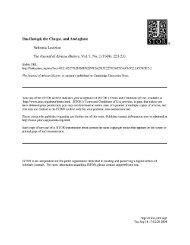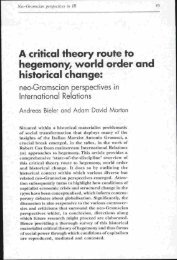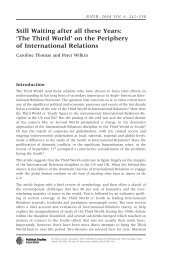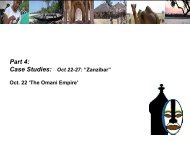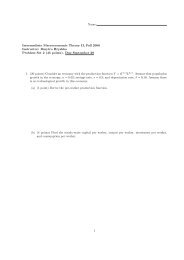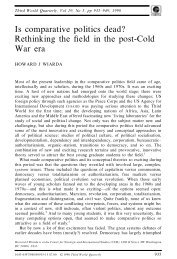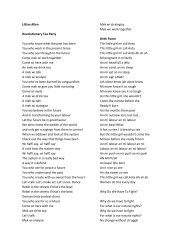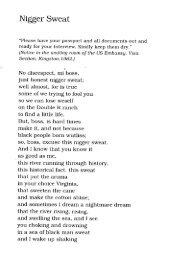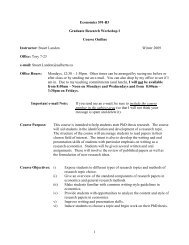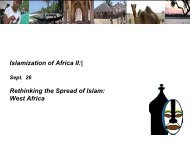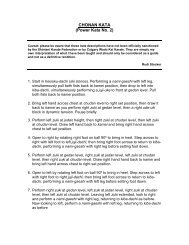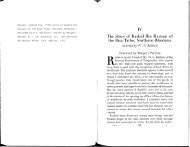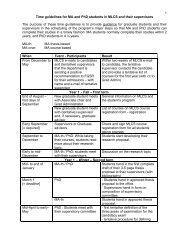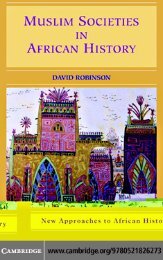personal memories revolutionary states and indian ocean migrations
personal memories revolutionary states and indian ocean migrations
personal memories revolutionary states and indian ocean migrations
Create successful ePaper yourself
Turn your PDF publications into a flip-book with our unique Google optimized e-Paper software.
coconuts in half <strong>and</strong> use an iron stick, a “shanga,” that’s what they<br />
would call it, to skewer the coconuts, <strong>and</strong> we’d put the coconuts<br />
above a fire. I would add to the fire, <strong>and</strong> when it would go down, I<br />
would add more, <strong>and</strong> then, when they were cooked, they would be<br />
ready. We would use them to make bags <strong>and</strong> would sell them.<br />
The process of preparing the coconut husks for drying, a process foreign<br />
to those in Northern Oman <strong>and</strong> foreign to me, fascinated her <strong>and</strong> my own<br />
inexperience provided an occasion to describe it. Rather than cloves, whose prices<br />
were dropping, Ghania <strong>and</strong> her husb<strong>and</strong> focused their business on copra.<br />
I then asked who worked for them.<br />
Omanis. They would work (yishtighilû), sometimes 5 or 6 people.<br />
Ghania’s gr<strong>and</strong>son, Sayf, who was sitting with us, suddenly asked: “You<br />
would rent them (tistagirûhum), the workers, or were they servants (akhdâm) that you had (‘an<br />
<strong>and</strong>kum)?”<br />
They were workers (‘ummâl), workers. They worked (yishtighilû).<br />
Workers.<br />
Again, Sayf: “From there? You would find them there?”<br />
No, not from there, they were all Omanis, all of them. There was<br />
Su‘ud bin Ali, he worked, <strong>and</strong> there was Hashu, you know him, the<br />
one who used to work at the hospital, at the doors. Then, Muhsin<br />
bin Shaykhan worked with us (ma‘nâ), <strong>and</strong> Mohammad bin Khamis.<br />
Sayf: “And you’d give them a salary (ma‘âsh)?”<br />
What’s wrong, yes, we’d give them money.<br />
Sayf: “So, they weren’t servants, they would work (shtughul)?”<br />
We’d give them money. One would carry (yisuq) coconuts, one<br />
would pick up (yatla‘) coconuts, one would go to the town also,<br />
taking <strong>and</strong> bringing wood. And Su‘ud, do you know Su‘ud who<br />
now fertilizes your father’s date palms? Well, him. He was young<br />
when he came to us. He was young, like Nasr [who was about 10],<br />
when he came to Zanzibar, he worked. First he worked in the store<br />
<strong>and</strong> then he sold wood, he’d go to the town.<br />
For Sayf, “work” clearly meant getting paid with money, <strong>and</strong> thus it meant<br />
not being a servant. Ghania, though, does not answer whether or not their workers<br />
were servants (akhdâm). Instead, she says that they were paid, that is, that they were<br />
not slaves, <strong>and</strong> that they were “Omani”. Ghania, here, is eliding the question of<br />
how people of the servant class, although engaged in wage labor, continued to be<br />
servants.<br />
And then there was the clove season. There, we knew people from<br />
“the neighborhood” (al-hâra) [the village neighborhood], <strong>and</strong> the<br />
town too. There were many from the town, we got to know. They<br />
would work with us during the clove season. They would put the<br />
seed on one side, <strong>and</strong> would put, what do they call it? “maqoni”, or<br />
“makroni”, on the other side. And then they would come <strong>and</strong> we’d<br />
weigh by the kilo, on the scale, <strong>and</strong> give them money at the price of<br />
the kilo, <strong>and</strong> then we’d give them their pay (igârathum). And I was in<br />
the store.<br />
http://web.mit.edu/cis/www/mitejmes/<br />
27



